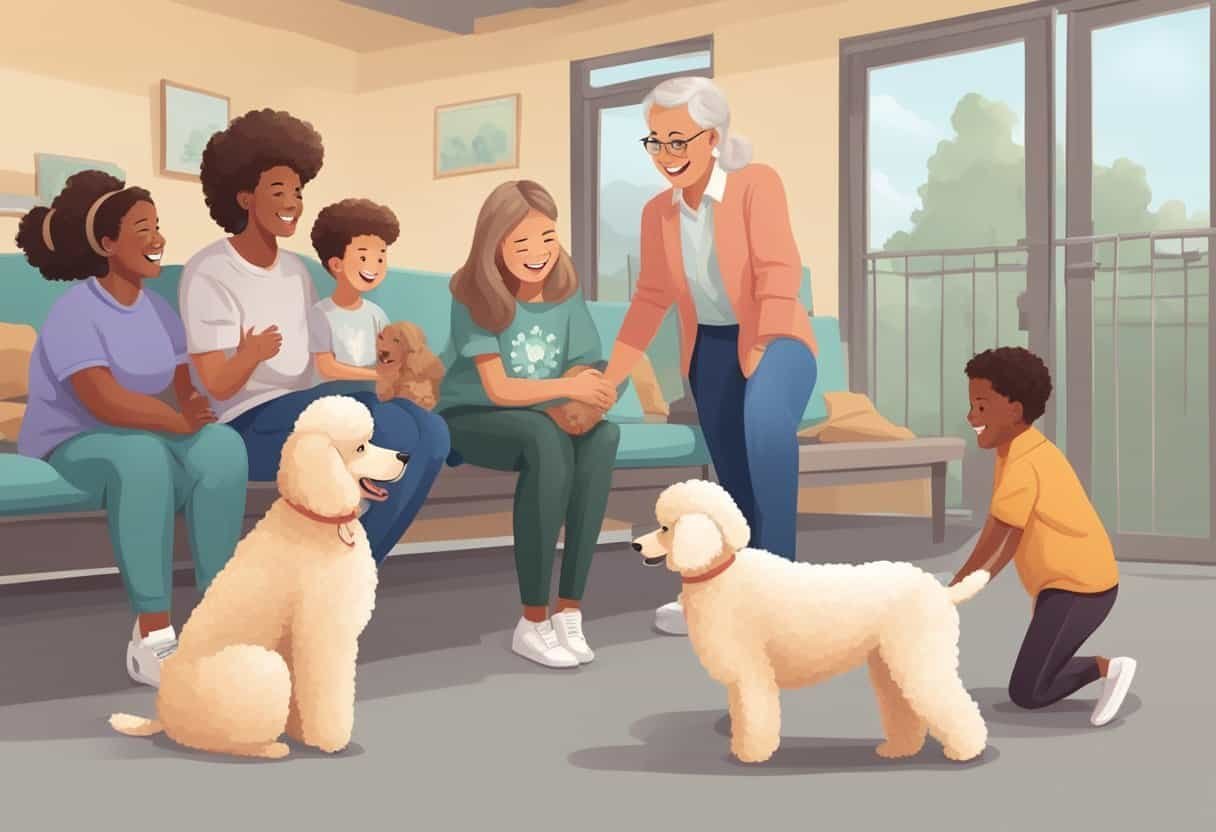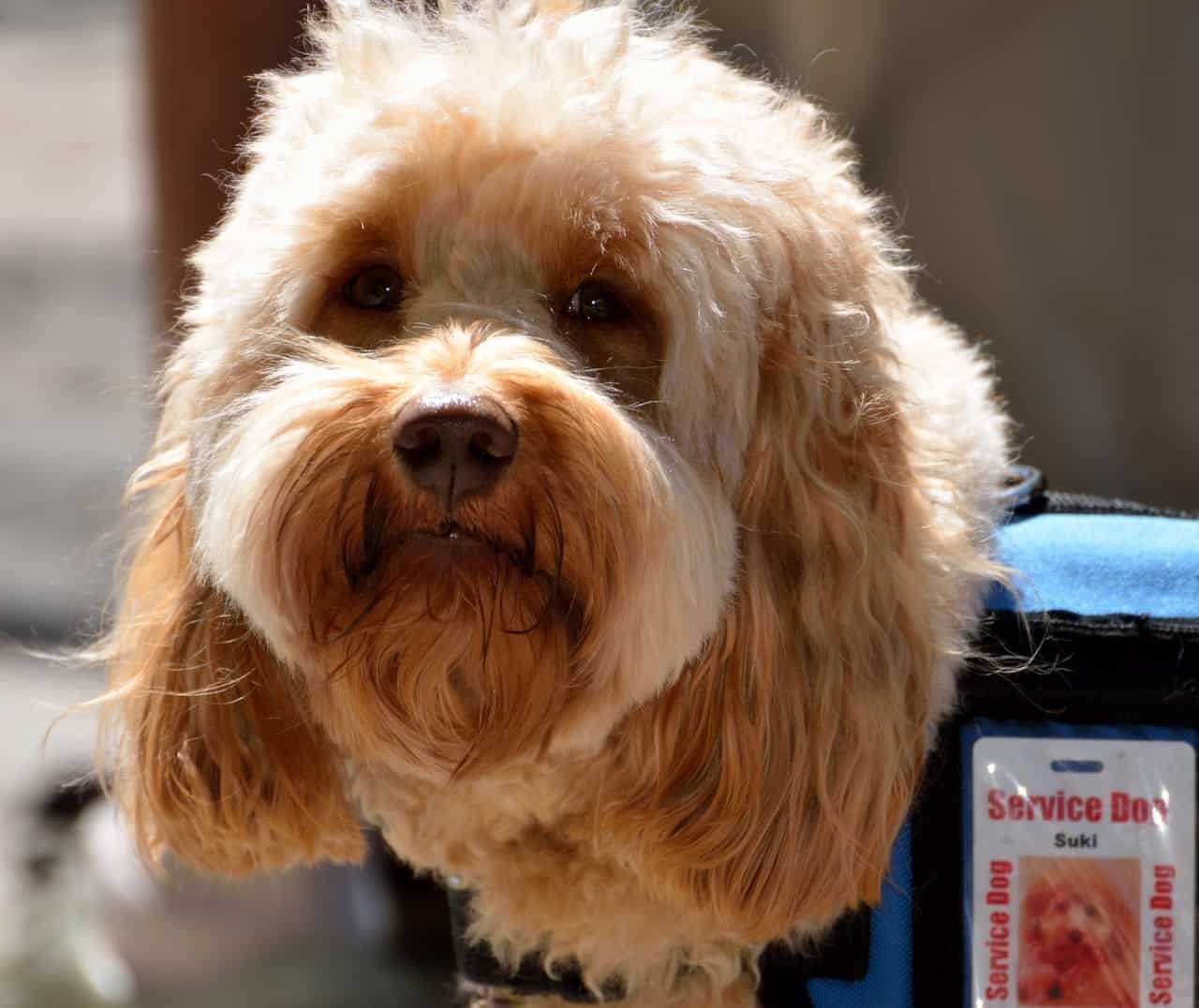Training your poodle to be a service dog can be a rewarding experience for both you and your furry friend. Poodles are intelligent, trainable, and adaptable dogs that make excellent service animals. They are well-suited for a variety of service work, including guide dogs for the visually impaired, hearing dogs for the deaf, mobility assistance dogs, medical alert dogs, and more.
Last Updated: November 2025 · This article has been reviewed and updated to ensure accuracy and relevance.
Before you start training your poodle for service work, it’s important to understand what service dogs are and what they do. Service dogs are specially trained animals that provide assistance to people with disabilities. They are not pets and have legal protections under the Americans with Disabilities Act (ADA). Service dogs are trained to perform specific tasks that help their handlers with daily activities and improve their quality of life.
To train your poodle to be a service dog, you will need to assess their suitability for the job, choose the right training methods, and work with professional trainers. You will also need to understand the legalities and certifications involved in service dog training and maintenance. With patience, consistency, and dedication, you can help your poodle become a valuable service animal that enhances your life and the lives of others.
Key Takeaways
- Poodles make excellent service dogs due to their intelligence, trainability, and adaptability.
- Service dogs are specially trained animals that provide assistance to people with disabilities.
- To train your poodle to be a service dog, you will need to assess their suitability, choose the right training methods, and work with professional trainers.
Understanding Service Dogs
Quick Start: Follow these steps for best results with your poodle.
If you have a disability and require assistance with daily tasks, a service dog may be an excellent option for you. Service dogs are highly trained animals that can perform a variety of tasks to help their owners with disabilities. The Americans with Disabilities Act (ADA) defines a service animal as a dog that is trained to perform tasks for an individual with a disability.
Service dogs are different from emotional support animals (ESAs) and therapy animals. While ESAs and therapy animals can provide comfort and support to their owners, they do not have the same level of training as service dogs and are not granted the same level of access to public places and facilities under the ADA.
It’s important to note that not all dogs are suitable for service dog training. Service dogs must have the right temperament, intelligence, and physical ability to perform the tasks required of them. Some breeds, such as Poodles, are more commonly used as service dogs due to their trainability and intelligence.
Under the ADA, service dogs are allowed to accompany their owners in public places and facilities, such as restaurants, stores, and public transportation. This means that service dogs must be well-behaved and under control at all times. However, there are some exceptions, such as certain areas of hospitals where service dogs may be restricted due to health and safety concerns.
It’s important to understand that service dogs are not pets, but rather working animals that provide a valuable service to individuals with disabilities. As such, it’s important to respect their role and not distract or interfere with them while they are working.
Choosing the Right Breed
When it comes to choosing a breed for a service dog, it’s essential to consider their temperament, trainability, and size. Poodles are one of the most popular breeds for service dogs, and for good reasons. They are highly intelligent, trainable, and hypoallergenic, making them an excellent choice for people with allergies.
Poodles come in three sizes: standard, miniature, and toy. While all three sizes can make excellent service dogs, standard poodles are the most commonly used for this purpose. They are large enough to perform tasks like opening doors and retrieving items while still being small enough to fit comfortably in most spaces.
Other breeds that make great service dogs include Labrador Retrievers and Golden Retrievers. Both breeds are highly intelligent, loyal, and trainable. They are also known for their friendly and gentle nature, making them excellent companions for people with disabilities.
When choosing a breed, it’s essential to consider your specific needs and lifestyle. If you have allergies, a hypoallergenic breed like the poodle may be the best choice. If you need a dog that can perform physical tasks, a larger breed like the standard poodle, Labrador Retriever, or Golden Retriever may be more suitable.
It’s also important to consider the breed’s energy level and exercise needs. While poodles and retrievers are generally high-energy breeds, they still require daily exercise and mental stimulation to stay healthy and happy. If you lead a more sedentary lifestyle, a breed with lower energy levels like a Bichon Frise or a Cavalier King Charles Spaniel may be a better fit.
Overall, choosing the right breed is a crucial step in training your poodle to be a service dog. By selecting a breed with the right temperament, size, and energy level, you can ensure that your dog will be able to perform the tasks you need them to and provide you with the companionship and support you need.
Poodle Characteristics Relevant to Service Work
When considering a dog breed for service work, it’s important to keep in mind that not all dogs are created equal. Poodles are a popular choice for service work because of their intelligence, focus, temperament, and behavior.
Poodles are known for being calm and loyal, making them great companions for those in need of service dogs. They are also versatile and can be trained to perform a variety of tasks, including mobility assistance, medical alert, and guide work. Additionally, poodles are hypoallergenic, which makes them a great choice for people with allergies.
One of the most notable characteristics of poodles is their intelligence. They are highly trainable and can quickly learn new commands and tasks. This intelligence also makes them highly focused, which is important for service work. Poodles are known for their ability to concentrate on a task for extended periods of time without losing focus.
Another characteristic of poodles that makes them great for service work is their coat. Poodles have a unique coat that is hypoallergenic and does not shed. This means that they are a great choice for people with allergies and for those who don’t want to deal with shedding. However, poodles require regular grooming to keep their coat in good condition.
In summary, poodles are an excellent choice for service work due to their intelligence, focus, temperament, behavior, loyalty, versatility, hypoallergenic coat, and calm demeanor. They are highly trainable and can be trained to perform a variety of tasks, making them a great companion for those in need of service dogs.
Assessing Your Poodle’s Suitability
Before embarking on training your poodle to be a service dog, it’s important to assess their suitability for the role. Not every poodle is cut out for the job, and it’s important to be realistic about your dog’s abilities.
Age
Age is an important factor to consider when assessing your poodle’s suitability for service dog training. Generally, service dogs are trained from a young age, so if your poodle is older, it may be more difficult to train them to perform the necessary tasks. However, older poodles can still be trained to be service dogs, as long as they are in good health and have the right temperament.
Health
Your poodle’s health is also an important consideration. Service dogs need to be in good physical health, as they will be expected to perform a range of tasks that require strength and agility. If your poodle has any health conditions that could affect their ability to perform these tasks, it may not be suitable for service dog training.
Personality
Your poodle’s personality is perhaps the most important factor to consider when assessing their suitability for service dog training. Service dogs need to be calm, patient, and well-behaved, even in stressful or unfamiliar situations. They also need to be able to focus on their tasks and ignore distractions. If your poodle is easily distracted, anxious, or aggressive, it may not be suitable for service dog training.
Motivated
Service dogs need to be highly motivated to perform their tasks, even when they don’t feel like it. If your poodle is not particularly motivated, it may not be suitable for service dog training. However, if your poodle is highly motivated and eager to please, it may be a good candidate for service dog training.
Adaptability
Service dogs need to be able to adapt to a wide range of situations and environments. They may need to travel frequently, work in noisy or crowded environments, and interact with a range of people and animals. If your poodle is not adaptable and struggles with change, it may not be suitable for service dog training.
In summary, assessing your poodle’s suitability for service dog training is an important first step. Consider your poodle’s age, health, personality, motivation, and adaptability before embarking on training. If your poodle is not suitable for service dog training, there are still plenty of other ways to enjoy spending time with your furry friend.
Training Your Poodle for Service Work
Training your poodle to become a service dog requires patience, dedication, and consistency. It is important to note that not all poodles are suitable for service work, so it is imperative to evaluate your poodle’s temperament and abilities before beginning training sessions.
To start, socialization is key. Exposing your poodle to diverse environments and people will help them become comfortable in a variety of situations. This will also help them stay calm and focused in distracting environments. Leash training is also important, as your poodle will need to be well-behaved and under control while out in public.
When it comes to actual training sessions, it is best to break them up into short, frequent sessions. This will help your poodle concentrate and retain information better. Positive reinforcement is the most effective way to train your poodle, using treats and praise to encourage desired behaviors.
In addition to basic obedience training, service dogs must also learn specific tasks related to their owner’s needs. This can include retrieving items, opening doors, or providing physical support. Tricks can also be useful in service work, such as turning lights on and off or alerting to sounds.
It is important to develop a strong bond with your poodle throughout the training process. This will help them understand their role as a service dog and strengthen their desire to please their owner.
Overall, training your poodle for service work is a rewarding and challenging process. By prioritizing socialization, positive reinforcement, and specific task training, you can help your poodle become a valuable asset to those in need.
Specific Tasks Training
Training your poodle to perform specific tasks is a crucial part of their service dog training. Depending on the needs of their handler, a poodle can be trained to perform a variety of tasks such as mobility work, balance assistance, fetching items, and more.
For mobility work, a poodle can be trained to assist their handler with walking, climbing stairs, and getting up from a seated position. They can also be trained to retrieve items that have fallen out of reach, such as a dropped phone or keys.
For hearing impairment, poodles can be trained as hearing dogs to alert their handler to important sounds such as doorbells, alarms, and approaching vehicles. They can also be trained to alert their handler to oncoming seizures or panic attacks in the case of PTSD or anxiety.
Poodles can also provide emotional support and assistance for those with mental disorders such as autism or PTSD. They can be trained to recognize signs of distress and provide comfort and support to their handler.
When training your poodle for specific tasks, it is important to work with a professional trainer who can tailor the training to your specific needs. It is also important to keep in mind that not all poodles are suited for all tasks, and it is important to choose a task that is appropriate for your poodle’s size and temperament.
Overall, training your poodle to perform specific tasks can greatly improve the quality of life for their handler and allow them to live more independently. With patience, dedication, and the right training, your poodle can become a valuable and trusted service dog.
Understanding Certifications and Legalities
Before you start training your poodle to be a service dog, it is important to understand the certifications and legalities involved. A service dog is not just a pet, but a highly trained animal that provides assistance to individuals with disabilities. Therefore, it is important to be aware of the laws and regulations that govern service dogs.
The Americans with Disabilities Act (ADA) is the federal law that protects the rights of people with disabilities. According to the ADA, service animals are dogs that are specifically trained to perform tasks for people with disabilities. These tasks can include guiding people who are blind, alerting people who are deaf, pulling wheelchairs, and providing emotional support.
It is important to note that the ADA does not require certification or identification for service dogs. However, businesses and other public places can ask if the dog is a service animal and what tasks the dog has been trained to perform. They cannot, however, ask for documentation or proof of certification.
When it comes to housing, the Fair Housing Act (FHA) allows individuals with disabilities to keep a service dog in their home, even if there are no-pet policies in place. Landlords cannot charge extra fees or deposits for service animals, nor can they refuse to rent to someone with a service animal.
Many service dogs wear vests or harnesses to identify them as service animals. While these items are not required by law, they can be helpful in identifying the dog as a service animal and can make interactions with the public easier. However, it is important to note that vests and harnesses do not provide legal protection for service animals.
In summary, certification is not required for service dogs, but they must be trained to perform tasks for individuals with disabilities. The ADA and FHA protect the rights of individuals with disabilities and their service animals. While vests and harnesses are not required by law, they can be helpful in identifying service animals.
Working with Professional Trainers
If you are serious about training your poodle to be a service dog, it is highly recommended that you work with professional trainers. A professional trainer can help you train your dog to be a service dog in a way that is safe, effective, and humane. They can also help you navigate the complex world of service dog training, including legal requirements and certification.
When looking for a professional trainer, it is important to find someone who has experience training service dogs. Look for trainers who are affiliated with reputable organizations, such as Assistance Dogs International or the International Association of Assistance Dog Partners. These organizations have strict standards for training and certification, so you can be sure that the trainer you choose is qualified to help you train your poodle.
Working with a professional trainer can also help you overcome any training challenges that you may encounter. For example, some poodles may be more difficult to train than others, and a professional trainer can help you identify the best training methods for your dog’s personality and temperament.
In addition to working with a professional trainer, it is important to remember that the trainability of your poodle is also a factor in their success as a service dog. Poodles are known for their intelligence and trainability, which makes them a popular choice for service dog work. However, it is important to remember that each dog is unique, and some may be more suited to service work than others.
Overall, working with professional trainers can help ensure that your poodle is trained to be a successful service dog. With the right training and guidance, your poodle can provide invaluable assistance to those in need.
Maintaining Your Poodle’s Health and Well-being
Your poodle’s health and well-being are crucial to their ability to serve as a service dog. Here are some tips to keep your poodle healthy and active:
Grooming
Regular grooming is essential for your poodle’s well-being. Poodles have curly hair that can easily become matted, so you will need to brush your poodle’s coat regularly. You should also trim their hair and nails regularly to prevent any discomfort or injury. Additionally, you should clean your poodle’s ears and teeth regularly to prevent infections.
Exercise
Poodles are energetic dogs that need plenty of exercise to stay healthy and active. You should take your poodle on daily walks and engage in activities like swimming and playing fetch to keep them active. Regular exercise will also help your poodle maintain a healthy weight, which is important for their overall health.
Health Check-ups
Regular check-ups with your veterinarian are essential for your poodle’s health. You should schedule annual check-ups and vaccinations to ensure that your poodle is healthy and up-to-date on all necessary vaccinations. Additionally, you should monitor your poodle for any signs of illness or injury and seek veterinary care when necessary.
Proper Nutrition
Proper nutrition is essential for your poodle’s health and well-being. You should feed your poodle a high-quality, balanced diet that is appropriate for their age and activity level. You should also provide your poodle with plenty of fresh water to keep them hydrated.
By following these tips, you can help maintain your poodle’s health and well-being, ensuring that they are able to serve as a service dog to the best of their ability.
Frequently Asked Questions
If you’re considering training your poodle to be a service dog, you probably have a few questions. Here are some common questions and their answers:
What are the best service dog breeds for anxiety?
While any breed can be trained as a service dog, some are better suited for certain tasks than others. Breeds that are often recommended for anxiety include Golden Retrievers, Labradors, and Poodles. These breeds are known for being intelligent, trainable, and calm.
What is the average time it takes to train a service dog?
The amount of time it takes to train a service dog varies depending on the dog’s breed, temperament, and the tasks it will be trained to perform. On average, it can take up to two years to fully train a service dog. However, this timeline can vary depending on the individual dog’s progress.
What are the types of assistance dogs?
There are several types of assistance dogs, including guide dogs, hearing dogs, mobility dogs, medical alert dogs, and psychiatric service dogs. Each type of service dog is trained to perform specific tasks to assist their handler with their disability.
Can standard poodles be trained as service dogs?
Yes, standard poodles can be trained as service dogs. Poodles are intelligent, trainable, and adaptable dogs that can excel in many different types of service work. They are often used as guide dogs, mobility dogs, and psychiatric service dogs.
What are the top three breeds for service dogs?
The top three breeds for service dogs are Golden Retrievers, Labradors, and German Shepherds. These breeds are known for their intelligence, trainability, and calm temperament.
Where can I find free service dog training programs?
Finding a free service dog training program can be challenging, as most training programs require a significant investment of time and resources. However, there are some organizations that offer free or low-cost training programs for qualifying individuals. Some examples include Canine Companions for Independence, Paws With A Cause, and Patriot Paws. It’s important to do your research and ensure that any organization you work with is reputable and has a proven track record of success.




